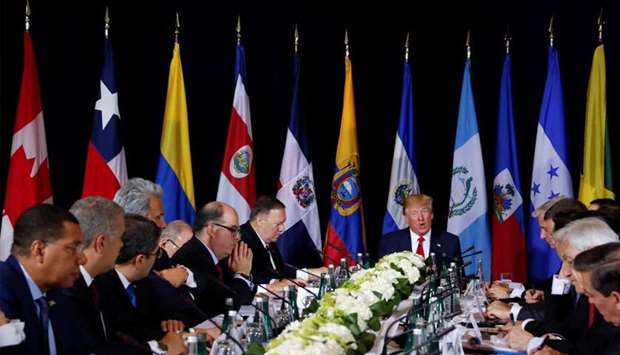* EU issues statement; sanctions seven Venezuelans
* EU under US pressure to get tougher on Maduro
The European Union warned on Friday it was ready to impose new economic sanctions on the government of Venezuelan President Nicolas Maduro to hasten change, saying the ‘grave situation’ in the country must end with a transition to new elections.
The statement by the EU, and its imposition on Friday of sanctions on another seven Venezuelan security and intelligence officers, marks a more severe tone from the bloc that has so far mainly sought to help mediate peace talks.
‘This grave situation ... cannot be ignored,’ the EU said, adding that talks to agree a new presidential election were essential to overcome the economic and political crisis in Venezuela, which faces hyperinflation and food shortages.
‘The EU confirms its readiness to work on further targeted measures to foster such a negotiated transition,’ the bloc said, although the sanctions are likely to disappoint the Venezuelan opposition, who are seeking far stronger European action against Maduro.
On Wednesday, EU envoys in Brussels agreed the new sanctions on the seven Venezuelans, taking the number of Venezuelans under EU ‘restrictive measures’ to 25. The European Union placed an arms embargo on Caracas in November 2017.
The EU released the names of those under new sanctions, which took effect on Friday, including Alexander Enrique Granko Arteaga, a senior official at Venezuela's directorate-general for military counter intelligence.
The EU accused him of ‘torture, excessive use of force causing death and injury and the ill-treatment of detainees ... committed by himself’.
The other sanctioned men were: Nestor Blanco Hurtado, a major in the Venezuelan military; Rafael Ramon Blanco Marrero, a senior official for military counter-intelligence; Carlos Calderon, a senior official in the intelligence service SEBIN; Alexis Enrique Escalona Marrero, head of the National Office Against Organized Crime and Terrorist Financing; Rafael Antonio Franco Quintero, an intelligence agent; Hannover Esteban Guerrero Mijares, former head of military counter-intelligence investigations.
BRUSSELS CONFERENCE
The EU also promised in its statement to hold an aid donor conference with the United Nations next month to raise more funds for Venezuelans, including the 4 million refugees who have fled into neighbouring South American countries.
Washington has been urging the European Union to take a tougher stance on Maduro, who France, the United States and several Latin American nations accuse of installing a dictatorship as the crisis deepens in Venezuela.
US Special Representative for Venezuela Elliott Abrams, in Brussels earlier this month to meet EU officials, had told reporters he ‘asked the EU to join us in keeping the pressure’ on Maduro because ‘they don't want to give up power’.
Under Maduro, Venezuela, which has the world's largest proven oil reserves, suffers chronic shortages of medical supplies and has seen its economy ruined.
Like the United States, most of the European Union has publicly backed Venezuelan opposition politician Juan Guaido as the man to help restore democracy. Maduro is accused of human rights violations and rigging the 2018 presidential election.
Maduro calls Guaido a US-backed puppet seeking to oust him in a coup.
However, much of the EU's diplomacy has been focused on trying to agree a negotiated end to the crisis and move towards a timetable for new presidential elections, so far to no avail.
The EU called on all parties to come back to negotiations chaired by Norway that Venezuela's opposition said had ended earlier this month, after Maduro's government froze its participation.

